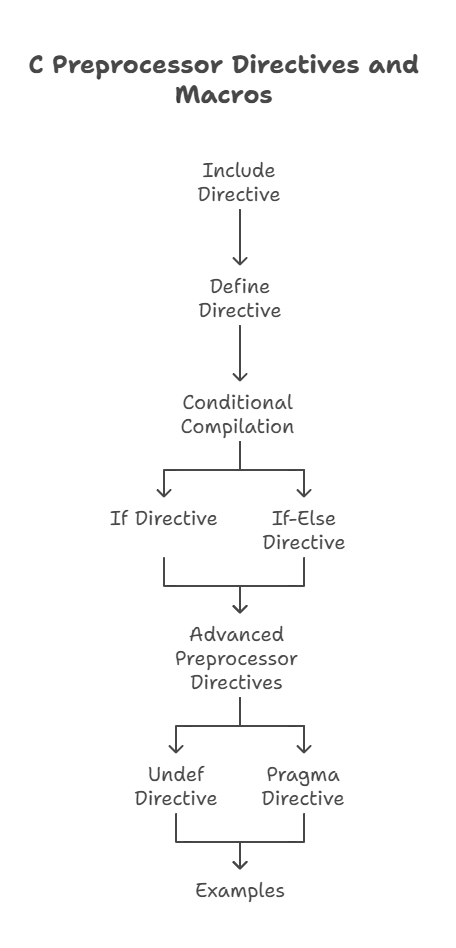Preprocessor directives and Macros
In C programming, the preprocessor is a program that processes your source code before it passes through the compiler. It's like a text substitution tool that modifies your code based on predefined instructions. Preprocessor directives are commands used to tell the preprocessor what to do.
Include Directive
The #include directive is used to include the contents of another file in the current file. This is commonly used for including header files that contain function prototypes and declarations.
#include <stdio.h>
int main() {
printf("Hello, World!\n");
return 0;
}
Explanation: In this example, the #include <stdio.h> directive is used to include the standard input-output header file, which provides functions like printf().
Define Directive
The #define directive is used to define constants or macros. It associates a name with a value or a code snippet.
#define PI 3.14159
int main() {
float radius = 5.0;
float area = PI * radius * radius;
return 0;
}
Explanation: Here, PI is defined as a constant with the value 3.14159. It can be used throughout the program to represent the value of pi.
Conditional Compilation
If Directive
The #if directive allows conditional compilation based on the evaluation of an expression.
#define DEBUG 1
#if DEBUG
printf("Debugging enabled\n");
#endif
Explanation: If the DEBUG macro is defined with a non-zero value (usually 1), the code inside the #if block will be included in the compilation.
If-Else Directive
The #ifdef and #ifndef directives are used to check whether a macro is defined or not.
#ifndef PI
#define PI 3.14159
#endif
Explanation: If the macro PI is not defined, it will be defined with the value 3.14159.
Advanced Preprocessor Directives
Undef Directive
The #undef directive is used to undefine a macro that has been previously defin.d.
#define PI 3.14159
#undef PI
Explanation: This will remove the definition of the PI macro.
Pragma Directive
The #pragma directive provides additional information to the compiler. It’s implementation-defined and can be used for various purposes like optimization and debugging.
#pragma warning(disable: 4996)
Explanation: This disables a specific warning (warning 4996 in this case) generated by the compiler.
Let’s see some examples to understand how preprocessor directives and macros work
#include <stdio.h>
#define DEBUG
#define PI 3.14159
#define AREA(radius) (PI * (radius) * (radius))
#define STRINGIZE(x) #x
#define CONCAT(x, y) x##y
int main() {
#ifdef DEBUG
printf("Debugging is enabled\n");
#endif
printf("The value of pi is: %f\n", PI);
printf("Area of circle with radius 5: %f\n", AREA(5));
printf("Stringized value of PI: %s\n", STRINGIZE(PI));
int xy = CONCAT(10, 20);
printf("Concatenated value: %d\n", xy);
return 0;
}
// output //
Debugging is enabled
The value of pi is: 3.141590
Area of circle with radius 5: 78.539750
Stringized value of PI: 3.141590
Concatenated value: 1020

Macros
Macros in C are a powerful feature that allow you to define reusable code snippets. They are essentially symbolic constants or small code snippets that get replaced by the preprocessor before compilation. Macros help in simplifying code, enhancing readability, and enabling code reusability.
A macro is defined using the #define directive. The syntax is:
#define MACRO_NAME value
Here, MACRO_NAME is the name of the macro, and value is what MACRO_NAME will be replaced with whenever it’s encountered in the code.
#include <stdio.h>
#define PI 3.14
int main() {
float radius = 5.0;
float area = PI * radius * radius;
printf("Area of circle: %f\n", area);
return 0;
}
// output //
Area of circle: 78.500000
Explanation: In this example, PI is defined as a macro with the value 3.14. Whenever PI is used in the code, it’s replaced by 3.14. This simplifies the calculation of the area of a circle.
Parameterized Macros
Parameterized macros allow you to define macros that can take arguments. They work similarly to functions but are replaced by the preprocessor before compilation.
#include <stdio.h>
#define SQUARE(x) ((x) * (x))
int main() {
int num = 5;
printf("Square of %d is %d\n", num, SQUARE(num));
return 0;
}
// output //
Square of 5 is 25
Explanation: Here, SQUARE is a parameterized macro that takes one argument x. When SQUARE(num) is encountered, it’s replaced by (num * num), effectively computing the square of the number.
Macro Pitfalls
While macros are powerful, they can lead to certain pitfalls if not used carefully
- Lack of type checking: Macros do not perform type checking, which can lead to unexpected behavior.
- Side effects: Macros can have side effects if arguments are not properly enclosed, leading to unexpected results.
- Readability: Overuse of macros can make code difficult to read and maintain.
Preprocessor directives and macros are powerful tools in C programming that allow for code reuse, conditional compilation, and text manipulation. By understanding these concepts, you can write more efficient and flexible code. However, it's essential to use them wisely to avoid potential pitfalls such as macro redefinition and code obfuscation.Happy coding!❤️
